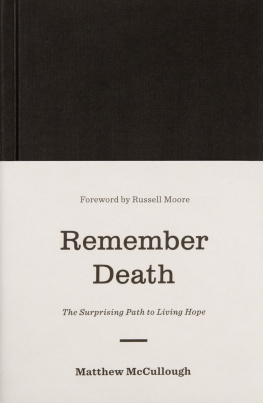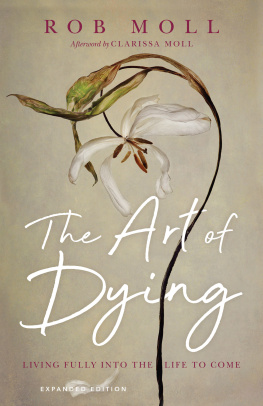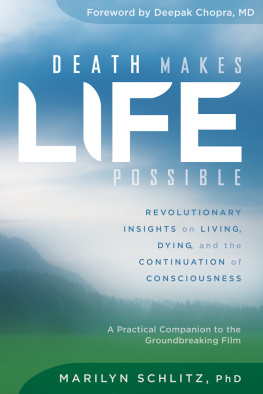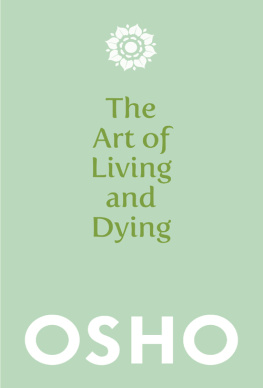Table of Contents
Landmarks
Throughout this book, I have tried to establish an ironic claim: facing up to the truth about death can lead us to deeper hope in life. My first goal, then, has been to encourage greater honesty about the facts. Perhaps more than any other culture anywhere in time or space, we in the modern West have detached ourselves from the reality of death. Weve lost our feeling for deaths sting.
Remember Pascals image from back in chapter 1? The human condition as a lineup of condemned prisoners, facing execution one by one, every man seeing his own death pictured in the death of every other. We draw back from this image by instinct. It seems unrealistically dark and even dangerous to us now. And even by the standards of his own day, surely, he meant for this image to be jarring. But Pascal took death personallynot as someone elses problemand in this personal engagement his perspective is far more consistent with the sweep of human history than ours. Far closer, too, to the perspective of the Bible. Ive argued that we would be wise to take death personally ourselvesto restore some of our feeling for deaths sting.
But honesty is no end in itself. Honesty about death is merely the first step. Honesty should lead us on to grief, and grief should lead us on to hope.
Through Honesty to Grief
There are other ways to face up to death besides grief, of course.
Both of these versions of death -a wareness amount to death -a cceptance . Sure, they may work against our detachment from deaths certainty. They encourage us to face up to the fact that everyone dies and theres nothing we can do about it. But they are fully detached from deaths meaning.
Ive argued that we must give up pretending, perhaps even believing, that were not going to die. But that doesnt mean we should make peace with the facts. Yes, you are going to die. So will everyone you love. And yes, that is and should be devastating, heart -b reaking news. Death -a cceptance is just as dishonest as death -a voidance .
Jesus s posture at the tomb of Lazarus is a powerful model for us here. When he comes to the tomb, he walks into a situation he has orchestrated. He knew Lazarus would die. In a sense he made sure of it, for his own purposes (John 11:16). But when he sees his friends in their grief, his heart is broken. When Jesus saw [Mary] weeping, and the Jews who had come with her also weeping, he was deeply moved in his spirit and greatly troubled (11:33). Then, when he reaches the tomb, when he sees with his own eyes the place holding his friends lifeless body, Jesus wept (11:35).
Dont miss the power of this simple statement. Jesus knew Lazarus was going to die. By choosing to delay his visit after news of Lazaruss illness, Jesus even made sure he would die. And Jesus knew exactly what he was about to do. He knew he would speak a word and bring this body back to life. Hes in complete control of this situation from beginning to end. But hes not callous. Hes not detached from the pain of those he loves. He doesnt scold anyone for weeping. He joins them. The reality of death and its effects on those he loves broke his heart.
Grief over death and all its many faces is the only honest, truthful response to a world that was not made to be this way. Grief tells the truth about the goodness of what God has given us. Its how we agree with Jesus about the offensiveness of deaths challenge to everything that is good and right and beautiful. Grief is not unbelief in what God will do. It isnt ingratitude for what God has done. Grief is simply honest, even Christlike.
If you choose to embrace death -a wareness , you should know this is also a choice to welcome grief into your life. And not just when youre standing next to the hospital bed or near the graveside. I mean grief as a daily companion. Anything less ignores the gap between what God has promised and what we experience now.
Through Grief to Hope
So, death -a wareness , for the Christian, should lead to grief, not to some sort of callous death -a cceptance . But grief itself is a means to an end. We mourn because thats a truthful response to the brokenness of the world as we experience it. But we dont grieve as those who have no hope (1 Thess. 4:13). If youll pardon a mixed metaphor, we need to feel deaths sting so that we can taste the sweetness of resurrection.
Augustine describes a surprising similarity between sorrow and dung. In the wrong place at the wrong time for the wrong purpose, both sorrow and dung defile whatever they touch. But in the right context, both can become fruitful, life -g iving fertilizer. Grief can become the soil where living hope takes root and grows strong.
Think of grief as a kind of telescope. To the naked eye perhaps the promises of Jesus seem small, beyond my frame of view, remote and disconnected from what I see around me. They belong to some other world than the one Im living in. But when I learn to see the painful truth about death, that begins to change. When I use my grief as a telescope, looking through it to grab hold of his image, Jesus comes forward and into focus, blown up to size so that he dominates my entire frame. The promise of life makes the pain of grief not a terminal condition but a transitional one. Grief is not a dead end but the necessary pathway to Jesus , a valuable means to a blessed end, a tool to be repurposed and fully leveraged.
Grief Clarifies What We Are Hoping For
There is a kind of grief that leads to despair.
Schulz is exactly right about what death means without the hope of an afterlife. There is no recovery. No redemption. No possibility of finding what youve lost. Its a terminal condition, not a transitional one. Finding, having, loving, enjoyingthose experiences are unusual, transitional. Only loss is normal, terminal. And this means that grief over what has been lost is always tethered to the past. It is a prison that traps us, keeps us chained to what was, and bars us from joy in what is. Or, to shift metaphors, grief is like a paddle we use to fight back against times ever -r olling stream.
But if Jesus can offer eternal life to those who are losing everything, then oh how different our grief becomes. It doesnt go away, because it shouldnt. But it is channeled into hope. In Christ our grief gains an aim, a new direction: grief gives rise to hope.
This is how death -a wareness carries us to clearer and deeper hope in what God has promised us. To long for the world to come, we need hearts and minds that recognize the truth about this world and cry out, No more! Thats why, when Revelation 21 describes the beauty of the new Jerusalem, it does so in negative terms. Its a place where every tear is wiped away, a place where death shall be no more, neither shall there be mourning, nor crying, nor pain anymore (Rev. 21:4).
So long as we are numb to deaths sting, the notion of a new heaven and a new earth is difficult to connect with. Its nearly impossible to visualize and just as difficult to long for. If the world to come conjures up no more than golden streets and celestial shores and chubby angels playing harps, it will remain distant and abstract and depersonalized. But as the opposite of death? As a restoration of what death steals away? Thats a promised world we can latch onto. Thats a world we can personally long for. But only if we take death personally. Only if we are willing to live with grief.
Grief Clarifies Where Our True Hope Lies
Honesty about death leads to grief, and grief over whats true about this world leads to hopeful longing for the world to come. But there is another way in which our heightened feeling for deaths sting clarifies our hope for redemption and resurrection. It helps us see that any hope we have rests completely on a Savior who died and rose again. No other hope will do.







